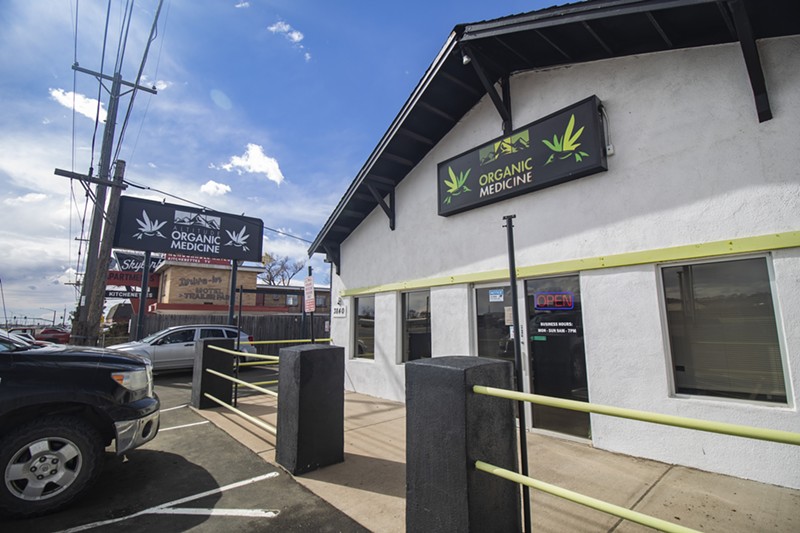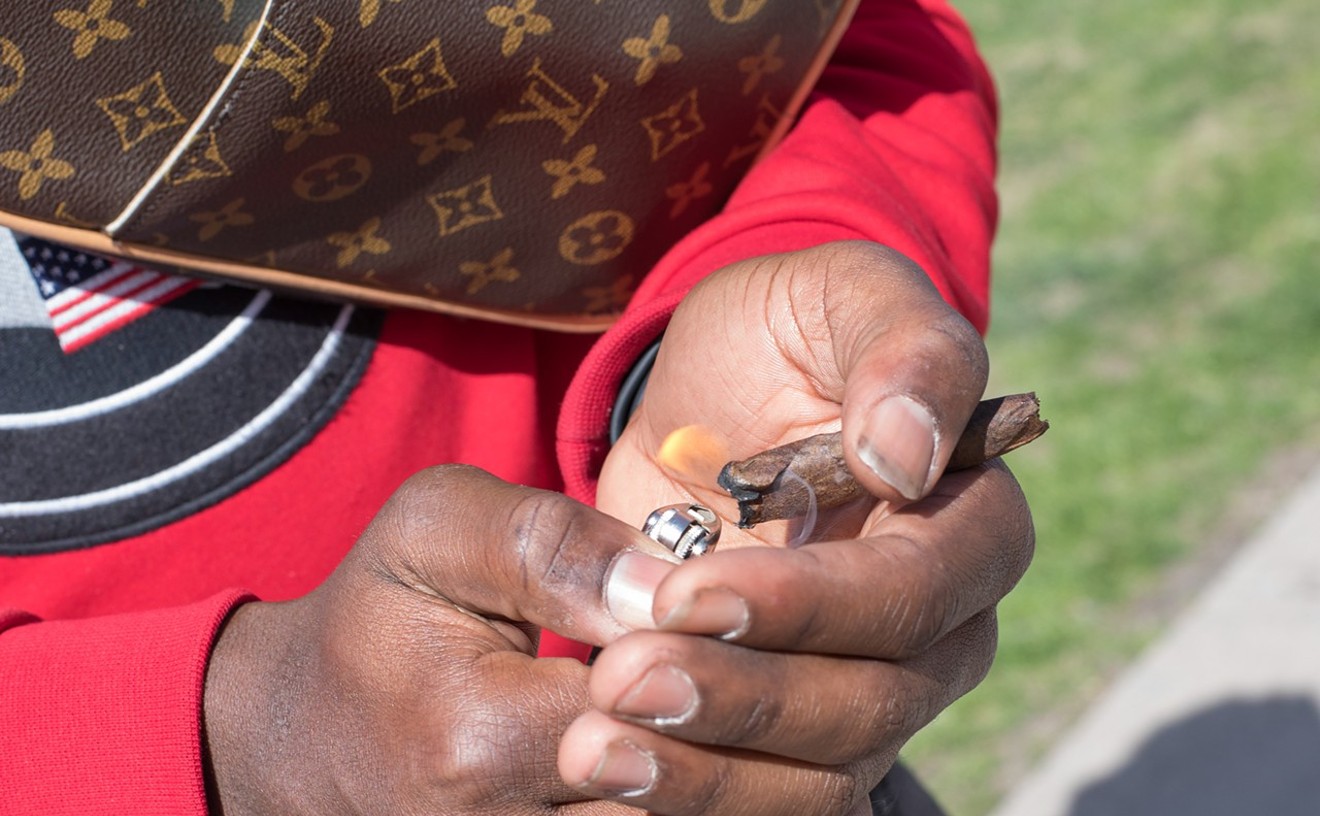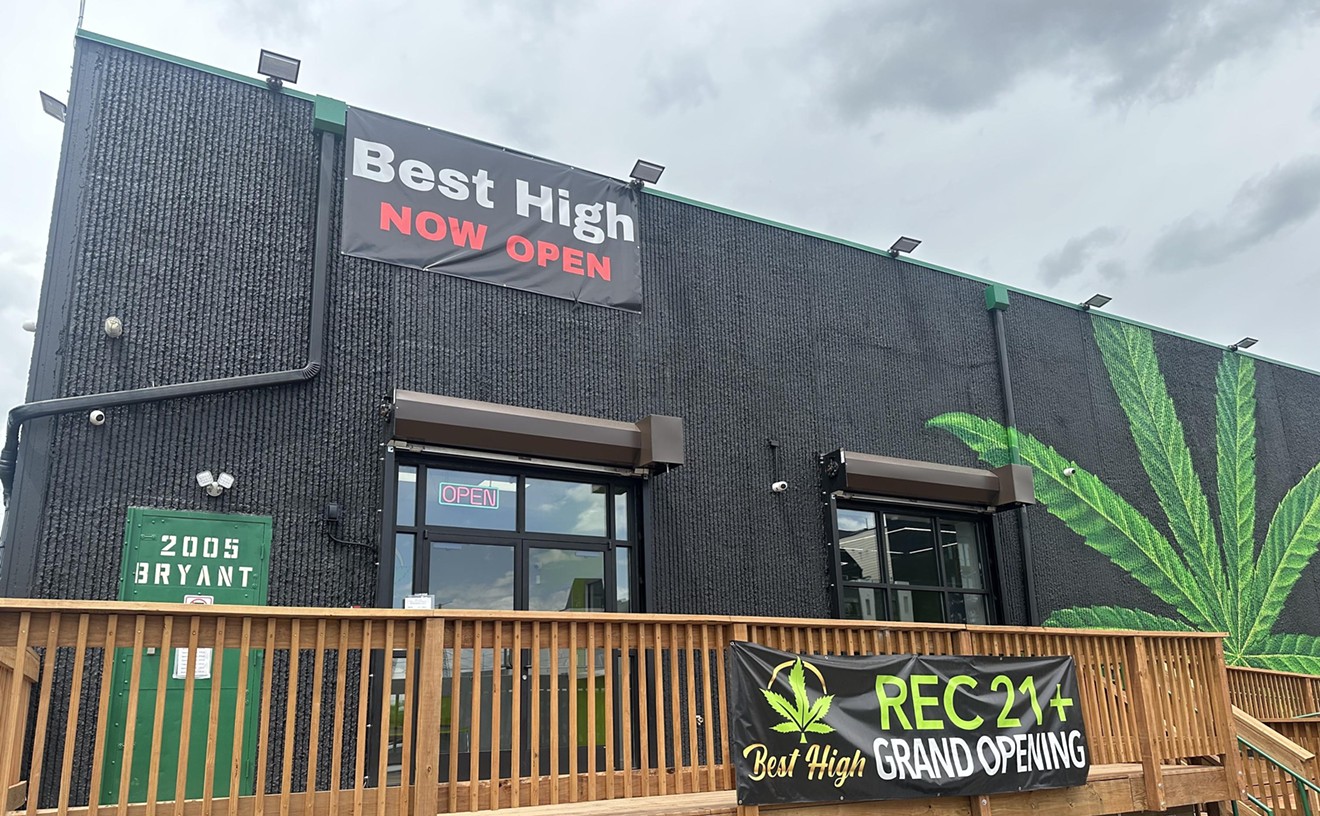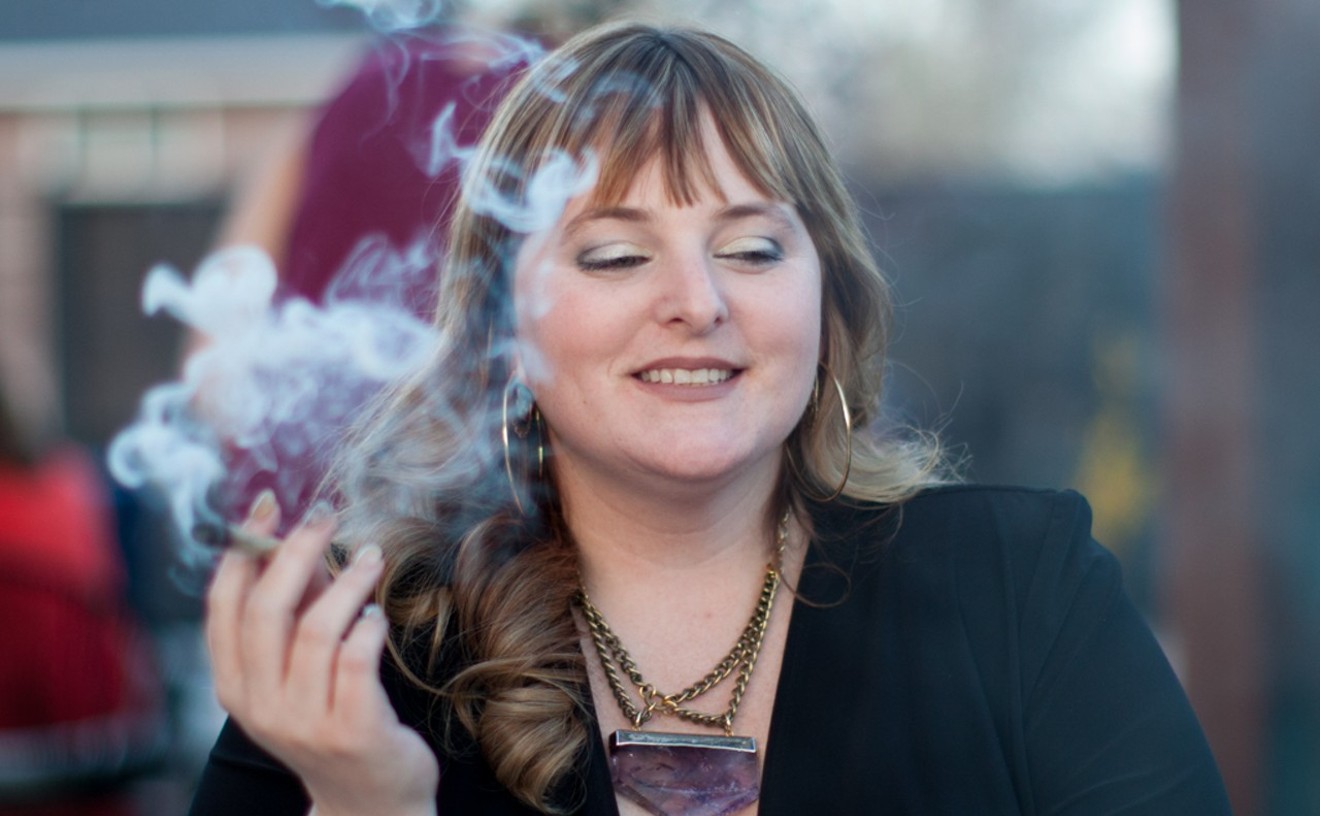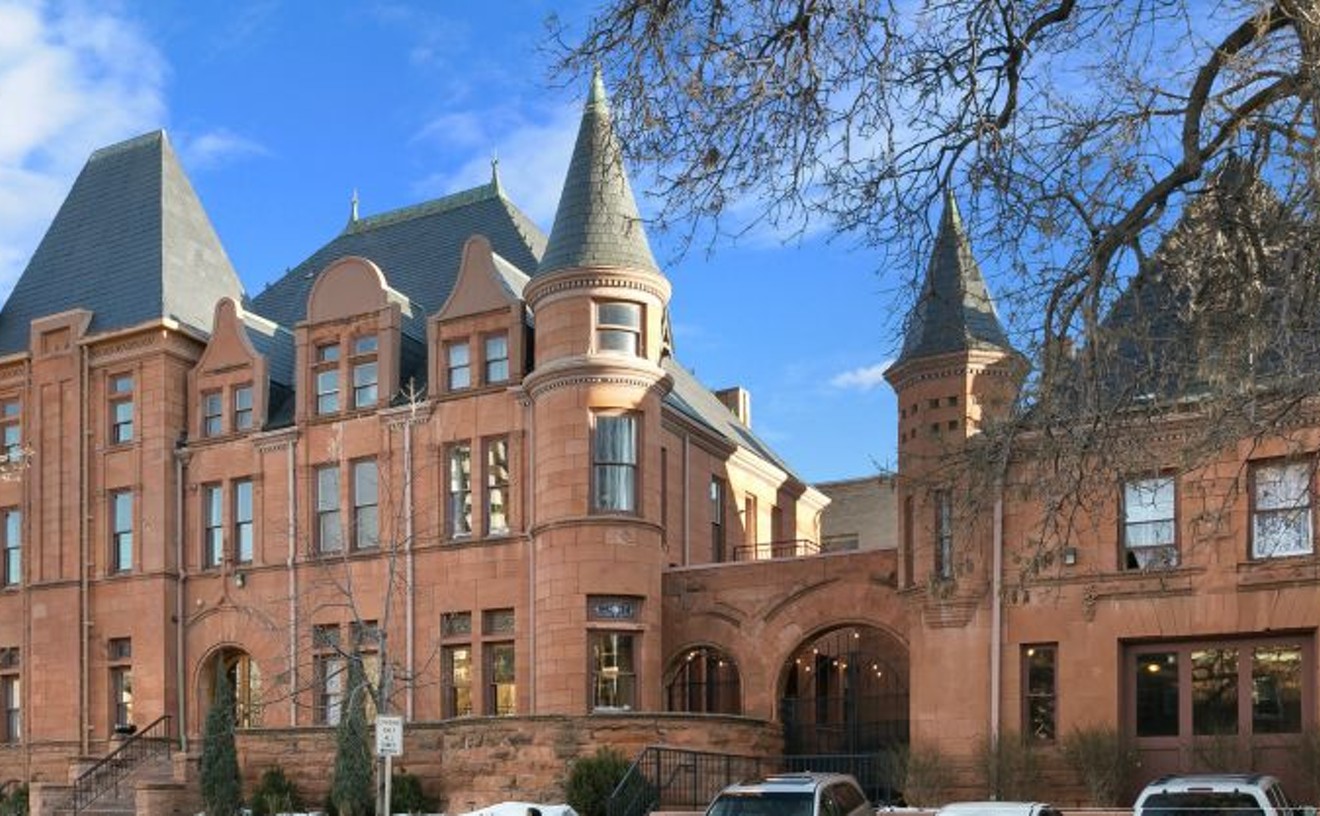Colorado's marijuana industry has been on a year-long slide, but business owners have high hopes that Colorado Springs can buck that trend.
The second-biggest city in the state, Colorado Springs has over 100 medical marijuana stores — but its city council banned recreational sales before they began in Colorado in 2014. Now marijuana users and business owners alike are bullish on November 8 ballot measures that propose ending the ban and creating a 5 percent sales tax on recreational pot.
"Per capita, there are twice as many residents per store in the Springs as there are in Denver," says Aaron Bluse, co-owner of Colorado dispensary chain Altitude Organic. "This could lead to the doubling or tripling of sales if you're in the right location."
Initiatives 300 and 301 propose giving all operating Colorado Springs dispensaries the choice of adding or transitioning into recreational sales. No additional licenses would be issued, and licenses lost due to dormancy or revocation would not be replaced. Recreational pot sales would carry a 5 percent special sales tax to fund mental health and public safety programs. Anthony Carlson, campaign organizer for Your Choice Colorado Springs, which is pushing the measures, estimates that a local marijuana sales tax would raise about $15 million annually in Colorado Springs.
"So far the reception has been pretty good, and we're receiving good feedback. We're pretty confident that we'll be happy on November 8," Carlson predicts.
Altitude Organic has four stores in Colorado Springs and a store in Dillon, where recreational sales are allowed. According to Bluse, the differences in earning power between his MMJ stores in Colorado Springs and the Dillon dispensary, which sells both medical and recreational marijuana, is stark.
A new law that went live this year both restricted a doctor's ability to recommend medical marijuana and limited the amount of concentrated THC that registered patients could buy per day, while factors such as inflation and a steep decline in wholesale marijuana prices have also impacted the market.
"Like any business, we've been absorbing a lot of the market changes, whether those be macro-economic pressures or micro-economic business issues inside the Colorado market, legislative or otherwise," Bluse says. "With the regulatory changes made, it has really hurt a lot of the [marijuana] business community."
Medical marijuana sales have experienced their lowest recorded monthly totals five times so far in 2022, and the price per pound of all commercial marijuana also reached a record low last week, according to the Colorado Department of Revenue. Recreational sales haven't fared much better, declining steadily for over a year, DOR data shows. Enabling over 100 already-operating stores to add recreational sales would give those stores a larger customer pool and create more commercial buyers for wholesale marijuana, suggests Bluse, whose company has donated $25,000 to the recreational sales campaign in Colorado Springs.
Altitude Organic and dozens of other marijuana companies and advocates have collectively donated almost $1.1 million toward Your Choice Colorado Springs, the organization pushing the marijuana sales and tax measures in the 2022 election, according to the Colorado Springs City Clerk. The parent company of Native Roots, one of the largest dispensary operations in Colorado, has donated over $268,000 to the cause, while LivWell, another Colorado dispensary chain, has donated $100,000. Several ownership groups based in other states, such as Cresco Labs and Ghost Group, have also made substantial donations.
Colorado Springs voters approved recreational marijuana legalization in Colorado by just over 2 percent in 2012 when Amendment 64 passed in the state, while informal polling done by local news outlet KOAA in 2021 showed that a majority continues to support recreational dispensaries in the city.
According to the state Department of Public Health and Environment, El Paso County, where Colorado Springs is located, has the most registered medical marijuana patients of any county in Colorado. However, the recent legislative changes to medical marijuana sales and doctor visits have made cannabis-friendly doctors leave town, says Jason Warf, executive director of the Southern Colorado Cannabis Council.
Warf's lobbying group represents marijuana businesses and medical patients in the southern portion of the state. He believes that if the recreational sales measure for Colorado Springs had been proposed five years ago, most of his members would've opposed it, citing fears of corporate consolidation and less medically focused dispensaries. As medical sales have declined, however, Warf says that his members are much more welcoming to the idea of recreational sales.
"The majority of our members are in favor, especially the legislative changes and the effects we're seeing with that," Warf says. "Generally speaking, [recreational sales] would be great for the Springs; I think the Springs could use the revenue. We're seeing the medical side decline, sadly, and we're seeing stores folding. It's just not a good environment anymore."
Apothecary Farms, a Colorado-based dispensary chain with stores across the state as well as in Oklahoma, turns away fifteen to twenty people per day who are looking for recreational pot at its Colorado Springs stores, according to marketing director Brent McDonald. Over the past year, Apothecary's Colorado Springs location has seen around a 50 percent fall in revenue, he notes.
"Things aren't going amazing down here right now. Going recreational would change everything," McDonald says. "On top of that, it would change the culture here a bit. I feel like Colorado Springs has untapped recreational potential, because we haven't had it here yet."
While adding recreational sales might help current medical marijuana businesses stay alive in Colorado Springs, industry stakeholders acknowledge that rec sales might also bring changes similar to what Denver has experienced over the last several years, including dispensary takeovers and a larger corporate presence that prefers recreational sales.
"This is one of the last straws for medical, or the straw that breaks the camel's back, if you will. In general, opening the amount of buyers or consumers that can come into stores is going to positively impact businesses, but there will probably be some licenses sold," McDonald notes.
Warf agrees. "What we don't want to see is an industry on either side controlled by a handful of people, and we're trending more and more that way in Colorado. We worry about pediatric patients losing access if this trends the way it has in Denver and in other large markets," he says. "Many in the paid lobby want to see the medical side gone, because that's not what their business model is."
Colorado Springs Mayor John Suthers, a vocal opponent of marijuana legalization and commercialization, has argued that if recreational sales are allowed, the city would experience other changes, such as rises in crime, a larger homeless population and even dropping in media rankings. He's also suggested that the United States Armed Forces might reconsider its concentration of activities in Colorado Springs if recreational marijuana sales were allowed, although cities across the country, such as San Diego, have both military bases and retail marijuana.
"What would happen to the Springs, a surplus of jobs? On its face, that argument is sort of nonsensical," Warf says in response to the mayor's concerns. "When I moved to Colorado in 2009, Denver truly was kind of a cowtown. It had empty real estate everywhere. You can't find real estate there nowadays, and the marijuana industry had something to do with that."
Suthers's office and the Colorado Springs Safe Neighborhood Coalition, an organization that has publicly opposed the recreational sales measures, did not respond to requests for comment.
Both marijuana measures would have to pass in order for recreational sales to begin in Colorado Springs. If approved, existing dispensaries could begin applying for new sales licenses by January 1 of next year.
Update: This article inaccurately linked the Colorado Springs Safe Neighborhood Coalition to the website of CONO, which is a different and unaffiliated organization based in Colorado Springs. We have removed that link.

Audio By Carbonatix
[
{
"name": "Air - MediumRectangle - Inline Content - Mobile Display Size",
"component": "12017618",
"insertPoint": "2",
"requiredCountToDisplay": "2",
"watchElement": ".fdn-content-body",
"astAdList": [
{
"adType": "rectangle",
"displayTargets": "mobile"
}
]
},{
"name": "Editor Picks",
"component": "17242653",
"insertPoint": "4",
"requiredCountToDisplay": "1",
"watchElement": ".fdn-content-body",
"astAdList": [
{
"adType": "rectangle",
"displayTargets": "desktop|tablet"
},{
"adType": "rectangle",
"displayTargets": "desktop|tablet|mobile"
}
]
},{
"name": "Inline Links",
"component": "18838239",
"insertPoint": "8th",
"startingPoint": 8,
"requiredCountToDisplay": "7",
"maxInsertions": 25
},{
"name": "Air - MediumRectangle - Combo - Inline Content",
"component": "17261320",
"insertPoint": "8th",
"startingPoint": 8,
"requiredCountToDisplay": "7",
"maxInsertions": 25,
"watchElement": ".fdn-content-body",
"astAdList": [
{
"adType": "rectangle",
"displayTargets": "desktop|tablet"
},{
"adType": "rectangle",
"displayTargets": "desktop|tablet|mobile"
}
]
},{
"name": "Inline Links",
"component": "18838239",
"insertPoint": "8th",
"startingPoint": 12,
"requiredCountToDisplay": "11",
"maxInsertions": 25
},{
"name": "Air - Leaderboard Tower - Combo - Inline Content",
"component": "17261321",
"insertPoint": "8th",
"startingPoint": 12,
"requiredCountToDisplay": "11",
"maxInsertions": 25,
"watchElement": ".fdn-content-body",
"astAdList": [
{
"adType": "leaderboardInlineContent",
"displayTargets": "desktop|tablet"
},{
"adType": "tower",
"displayTargets": "mobile"
}
]
}
]

